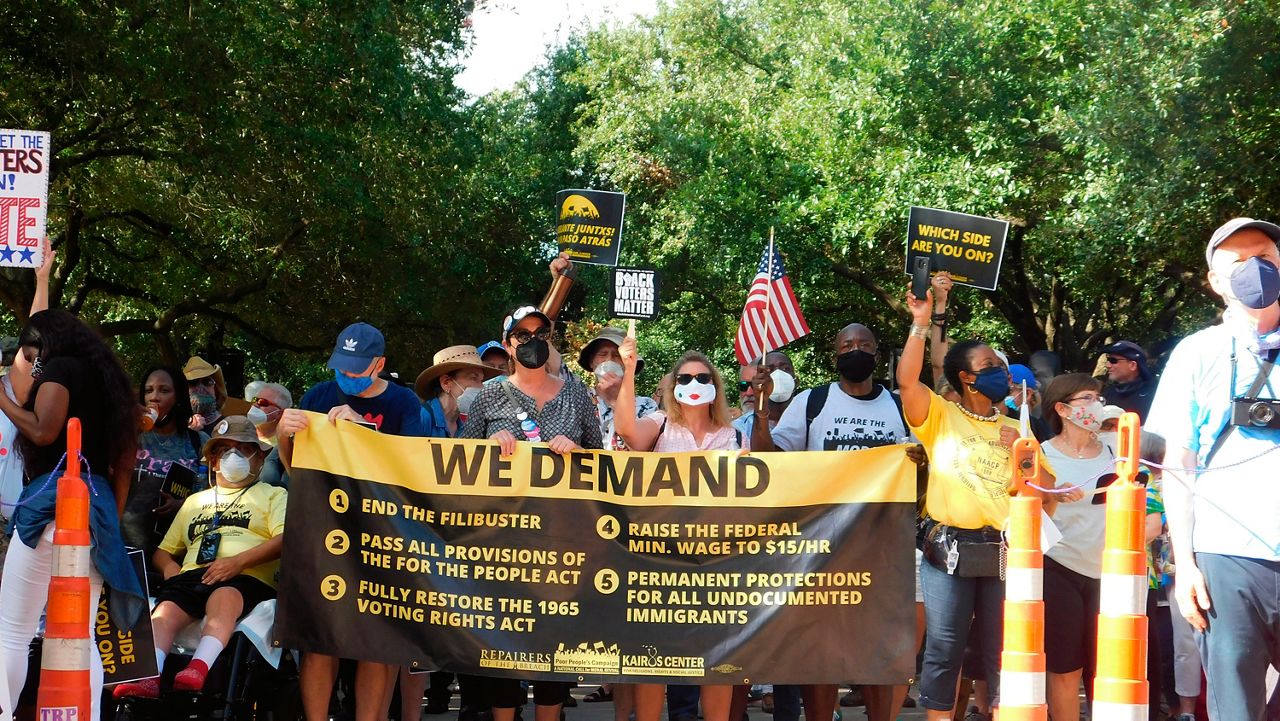The Department of Justice on Thursday filed a voting rights lawsuit against the State of Texas, as well as Texas' Secretary of State, over some of the provisions in the state's recently enacted voting law, Senate Bill 1.
The complaint claims that "certain restrictive voting procedures imposed by" the measure, signed into law by Republican Gov. Greg Abbott in September, violate the Voting Rights Act and the Civil Rights Act.
“Our democracy depends on the right of eligible voters to cast a ballot and to have that ballot counted,” Attorney General Merrick B. Garland wrote in a statement. “The Justice Department will continue to use all the authorities at its disposal to protect this fundamental pillar of our society.”
The DOJ wrote in a release that "by improperly restricting what assistance in the polling booth voters who have a disability or are unable to read or write can receive," the bill violates Section 208 of the Voting Rights Act.
Section 208 is the provision of the Voting Rights Act which guarantees assistance to voters with disabilities.
"The complaint alleges that Senate Bill 1 harms those voters by barring their assistors from providing necessary help, including answering basic questions, responding to requests to clarify ballot translations or confirming that voters with visual impairments have marked a ballot as intended," the DOJ statement reads.
The Justice Department complaint also says that the bill violates the landmark Civil Rights Act of 1964 "by requiring rejection of mail ballots and mail ballot request forms because of certain paperwork errors or omissions that are not material to establishing a voter’s eligibility to cast a ballot."
“The Civil Rights Division is committed to protecting the fundamental right to vote for all Americans,” Assistant Attorney General Kristen Clarke, who heads up the Justice Department’s Civil Rights Division, wrote. “Laws that impair eligible citizens’ access to the ballot box have no place in our democracy. Texas Senate Bill 1’s restrictions on voter assistance at the polls and on which absentee ballots cast by eligible voters can be accepted by election officials are unlawful and indefensible.”
In response to the lawsuit, Texas Attorney General Ken wrote: "I will see you in court, Biden!"
"Biden is coming after Texas for SB1, our recently enacted election integrity law," Paxton wrote on Twitter. "It’s a great and a much-needed bill. Ensuring Texas has safe, secure, and transparent elections is a top priority of mine."
Gov. Abbott shared a similar opinion, writing "bring it" in a Twitter post.
"The Texas election integrity law is legal," he wrote, claiming it increases voting hours.
"It does restrict illegal mail ballot voting," he continued. "Only those who qualify can vote by mail. It also makes ballot harvesting a felony. In Texas it is easier to vote but harder to cheat."
Among other things, the law also empowers partisan poll watchers and bans drive-thru voting and 24 hour voting.
Democrats in the Texas State House fled the state over the summer in an attempt to block the voting bill. They bolted for Washington, D.C., where they met with a number of prominent lawmakers, including Vice President Kamala Harris, House Speaker Nancy Pelosi, D-Calif., and Senate Majority Leader Chuck Schumer, D-N.Y.
They finally returned in August, ending a weeks-long holdout as the chamber could not reach quorum without them. The bill passed shortly thereafter and was signed into law by Gov. Abbott in September.
This is a developing story. Check back later for further updates.



